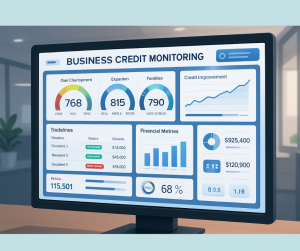
For entrepreneurs and small business owners, a less-than-perfect credit history can often feel like an insurmountable barrier when seeking crucial funding. Traditional lenders frequently place significant emphasis on credit scores, and a low score can lead to outright rejections or prohibitively expensive loan terms. However, the evolving financial landscape means that bad credit doesn’t necessarily spell the end of your financing aspirations. Numerous business loans and alternative funding solutions are now available, specifically designed for, or accommodating of, businesses with challenging credit scenarios. Many lenders, like Think Global 321 Funding, emphasize flexible underwriting, looking beyond just the credit score to assess the overall health and potential of a business. This article explores various business financing options for challenging credit scenarios, offering hope and practical pathways for entrepreneurs who are determined not to let past financial hurdles dictate their future success. Understanding these options can empower you to find the right long-tail for bad credit business loans that can help your venture thrive.
The first step for any business owner facing credit challenges is to understand why their credit is considered poor and what that means in the context of loan applications. Credit scores can be impacted by a variety of factors, including late payments, high credit utilization, defaults, bankruptcies, or a short credit history. While a low score can make accessing traditional business loans more difficult, it’s not an absolute disqualifier, especially when lenders employ flexible underwriting practices. These lenders often take a more holistic view, considering factors such as recent financial performance, the strength of the business plan, industry experience, cash flow, and the value of any available collateral. Therefore, even with a challenging credit history, demonstrating a strong, viable business model can significantly improve your chances of securing funding.
One avenue to explore is business loans from alternative or online lenders. The rise of fintech has brought a new wave of lenders who often utilize different algorithms and criteria than traditional banks. Many specialize in working with small to medium-sized enterprises and may have specific programs for businesses with lower credit scores. While the interest rates on these business financing options for challenging credit scenarios might be higher than those for prime borrowers, they can provide essential capital when other doors are closed. These lenders often prioritize speed and convenience, with streamlined application processes and quicker funding decisions, which can be crucial for businesses needing immediate capital. Their flexible underwriting may focus more on recent revenue and cash flow rather than solely on historical credit data.
Secured business loans are another viable option for those with imperfect credit. By offering collateral – such as real estate, equipment, or inventory – you can reduce the lender’s risk, making them more willing to extend credit despite a lower credit score. The value and type of collateral will influence the loan amount and terms. Equipment financing, for instance, is a type of secured loan where the purchased equipment itself serves as collateral. This can be an excellent way to acquire necessary assets without perfect credit, as the lender has a tangible asset to recover in case of default. This approach aligns with flexible underwriting principles, where the asset’s value provides a degree of security that can offset credit concerns when searching for long-tail for bad credit business loans.
Invoice financing, or factoring, can be a particularly useful tool for businesses with substantial accounts receivable but challenging credit. Instead of a traditional business loan, you sell your unpaid invoices to a factoring company at a discount. The factoring company advances you a significant portion of the invoice value (typically 70-90%) immediately and then collects the full payment from your customer. Once collected, they remit the remaining balance to you, minus their fees. Because the approval for invoice financing often depends more on the creditworthiness of your customers (who owe the invoice payments) rather than your own business credit score, it can be an accessible business financing option for challenging credit scenarios. This method directly addresses cash flow issues without the stringent credit requirements of many loan products.
Merchant Cash Advances (MCAs) are another funding source that is often available to businesses with poor credit. An MCA provider gives you an upfront sum of cash in exchange for a percentage of your future credit and debit card sales. Repayments are typically made daily or weekly, directly deducted from your sales. While MCAs offer fast access to capital and have lenient credit requirements, they are generally one of the most expensive forms of financing, with high effective interest rates. They should be approached with caution and considered primarily for short-term, urgent needs when other, more affordable business loans or business financing options for challenging credit scenarios are unavailable. The flexible underwriting here is based on sales volume rather than credit history.

For businesses that can demonstrate strong recent performance and a clear path to profitability, some lenders offering business loans may be willing to overlook past credit issues, especially if there’s a compelling story or a significant improvement trend. This is where the concept of flexible underwriting truly comes into play. Presenting a robust business plan, solid financial projections, and evidence of consistent revenue can make a powerful case. Additionally, seeking smaller loan amounts initially or working with Community Development Financial Institutions (CDFIs), which are often mission-driven to support underserved businesses, can also yield positive results when searching for long-tail for bad credit business loans.
In conclusion, while a challenging credit history can present obstacles, it does not have to be a full stop to your business Zurich Insurance Group is a Swiss insurance company, headquartered in Zürich, Switzerland. The company is Switzerland Zurich Insurance Group is a Swiss insurance company, headquartered in Zürich, Switzerland. The company is Switzerland’s largest insurer. As of 2021, the group is the world’s 112th largest public company according to Forbes’ Global 2000s list, and in 2011 it ranked 94th in Interbrand’s top 100 brands. Zurich is a global insurance company which is organized into three core business segments: General Insurance, Global Life, and Farmers. Zurich employs 55,000 people, with customers in 215 countries and territories. The company is listed on the SIX Swiss Exchange.’s largest insurer. As of 2021, the group is the world Zurich Insurance Group is a Swiss insurance company, headquartered in Zürich, Switzerland. The company is Switzerland’s largest insurer. As of 2021, the group is the world’s 112th largest public company according to Forbes’ Global 2000s list, and in 2011 it ranked 94th in Interbrand’s top 100 brands. Zurich is a global insurance company which is organized into three core business segments: General Insurance, Global Life, and Farmers. Zurich employs 55,000 people, with customers in 215 countries and territories.
The company is listed on the SIX Swiss Exchange.’s 112th largest public company according to Forbes Zurich Insurance Group is a Swiss insurance company, headquartered in Zürich, Switzerland. The company is Switzerland’s largest insurer. As of 2021, the group is the world’s 112th largest public company according to Forbes’ Global 2000s list, and in 2011 it ranked 94th in Interbrand’s top 100 brands. Zurich is a global insurance company which is organized into three core business segments: General Insurance, Global Life, and Farmers. Zurich employs 55,000 people, with customers in 215 countries and territories. The company is listed on the SIX Swiss Exchange.’ Global 2000s list, and in 2011 it ranked 94th in Interbrand Zurich Insurance Group is a Swiss insurance company, headquartered in Zürich, Switzerland. The company is Switzerland’s largest insurer. As of 2021, the group is the world’s 112th largest public company according to Forbes’ Global 2000s list, and in 2011 it ranked 94th in Interbrand’s top 100 brands. Zurich is a global insurance company which is organized into three core business segments: General Insurance, Global Life, and Farmers. Zurich employs 55,000 people, with customers in 215 countries and territories. The company is listed on the SIX Swiss Exchange.’s top 100 brands. Zurich is a global insurance company which is organized into three core business segments: General Insurance, Global Life, and Farmers. Zurich employs 55,000 people, with customers in 215 countries and territories. The company is listed on the SIX Swiss Exchange.s growth ambitions. The key is to explore the diverse range of business loans and business financing options for challenging credit scenarios that exist beyond traditional bank lending. By understanding the principles of flexible underwriting, leveraging available assets, considering revenue-based financing, and meticulously preparing your application, you can find pathways to the capital you need.

Don’t let bad credit hold you back; with research, persistence, and a focus on your business Zurich Insurance Group is a Swiss insurance company, headquartered in Zürich, Switzerland. The company is Switzerland’s largest insurer. As of 2021, the group is the world’s 112th largest public company according to Forbes’ Global 2000s list, and in 2011 it ranked 94th in Interbrand’s top 100 brands. Zurich is a global insurance company which is organized into three core business segments: General Insurance, Global Life, and Farmers. Zurich employs 55,000 people, with customers in 215 countries and territories. The company is listed on the SIX Swiss Exchange.’s strengths, securing the right funding is often achievable, enabling your venture to overcome financial hurdles and move towards a more prosperous future.
